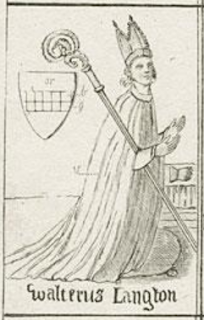Walter in 1272 was a rector of a church in Yorkshire, and it may have been through the Lord Chancellor Robert Burnell (who was also Archdeacon of York) that King Edward I became aware of Langton. Edward made Langton Keeper of the Wardrobe and, it was said, relied on him as his closest confidant. When the debate arose over succession in Scotland after the death of Alexander III, Edward sent Langton to represent England's interests.
In 1295, Langton was made Treasurer until 1307 (Edward's death). He was also given several ecclesiastical benefices from which he could recieve revenues. In 1296 he was made Bishop of Lichfield and rebuilt his residence there, Eccleshall Castle, into a much grander building.
His increasing wealth made him a target of the Barons, who asked Edward to dismiss him. He was accused of simony, adultery, murder, and witchcraft. Although he went to Rome for trial, Pope Boniface VIII sent him back to the court of Archbishop of Canterbury Robert Winchelsey. Winchelsey was hostile to Langton, due to Langton's siding with the king over taxation of the clergy. Despite this attitude, he found Langton innocent of the charges.
Edward I supported his Treasurer and councillor even when Langton quarreled with the king's son, Edward Caernarvon. Langton was opposed (as were others) to the influence over the prince of Piers Gaveston. When Edward I died and the prince became King Edward II and Gaveston returned from exile, Langton knew his time was past. Langton was arrested, imprisoned, and his lands and movable property were seized. Pope Clement V tried to intervene on his behalf, but the Barons also were against him and he stayed in prison until 1312. He was returned to his post as Treasurer, but Parliament asked that he be dismissed in 1315. He died on 9 November 1321.
It was startling that Winchelsey found Langton innocent, when he could have taken the opportunity to eliminate a thorn in his side. Winchelsey was an enemy of Edward I and Edward II and spent 20 years fighting them. I'll tell you about him tomorrow.

No comments:
Post a Comment
Note: Only a member of this blog may post a comment.